Question:
http://www.mytutor-jpn.com/info/2017/1028205851.html
TED Talks オリジナル動画
人体を作っている細胞は、情報を含む秘密の言語を持つ糖質でおおわれています。糖質は何を語ろうとしているのでしょう。糖質が語るその1つに、その人の血液型があり、そして、がんが発症しているかどうかも教えてくれているのかもしれません。化学生物学者であるキャロライン・ベルトッツィはがん細胞の糖質が免疫細胞と、どのように関わるのか(またどのように免疫細胞を誤摩化すのか)を研究しています。私達の体の中で、どのようにがんが検知され、最先端のがん治療薬が免疫系を助け、がんを駆除しているのかという話をお聴き下さい。
Question:
http://www.mytutor-jpn.com/info/2017/1028201645.html
TED Talks オリジナル動画
東ロボくんをご紹介します。このAIは、大学の入学試験で上位20%の成績を収めました—何も理解することなしに。ロボットがすぐ大学に入学するようになるわけではありませんが、東ロボくんの成功は人間の教育の未来に疑問を提起します。人間がAIより上手くできることについて子供たちが上達できるよう、私たちはどう助ければよいのでしょう?
Question:
http://www.mytutor-jpn.com/info/2017/1028194116.html
TED Talks オリジナル動画
たった一種類の動物しか診ない獣医を何と呼ぶでしょうか?それは医師です。魅力的なトークの中で、バーバラ・ナッターソン・ホロウィッツは、健康に対する種を跨ったアプローチがどのようにして人間という動物の医療 ― 殊に心の健康 ― を改善出来るかを語っています。
Part 1 (Comprehension Questions):
- What is the talk all about?
- What is the name of the sugar the speaker is talking about?
- What part of our body is being coated with this sugar?
- What type of cell have more sialic acid?
- What type of cell protects our body from diseases?
.
- In the picture slides shown by the speaker what color represents immune cells? Cancer cells?
- What kind of medicine does the speaker’s team are developing in their
lab?
- Who’s life was spared from malignant melanoma after taking new immune-stimulating drugs?
- How does these new immune-stimulating drugs treat our body from cancer?
10. What danger the sialic acid (sugar) has to do with our body?
Part 2 (Express Yourself Questions):
- What’s your blood type?
- Is it important to know our blood type?
- Does the blood type tell about the personality of an individual?
- Do you think Cancer is to be feared of?
- Is Cancer the most dangerous and deadliest sickness or disease?
- What will you do if you’ll find out you have a certain type of Cancer?
- How will you manage if a family member is diagnosed with a stage 3
Cancer?
- In your opinion, what’s the best prevention of any type of Cancer?
- Do you think cancer patient’s life is miserable or contented?
10. If given a chance to visit Cancer Patients’ Center or hospital, what would do to make them feel better?
11. Are you afraid to die?
12. What is your greatest fear?
13. How will we know that an individual is suffering from Cancer
without them telling us or us asking them?
14. Are you living a healthy lifestyle?
15. What is the most life-threatening disease you’ve encountered in
your life?
16. What defense mechanism do you know of cancer patients upon
their onset knowledge of the disease on their body?
17. Have you known any cancer patient who have been healed and
have a prolonged life even after the doctor concluded the number of years left for him to live?
18. How was it, in your opinion, to take care of a cancer patient?
19. Can we inherit cancer from our family or relatives?
20. What three things will you do if you only have 24-hours left to live
in this world?
Part 3 (Activity):
Vocabulary Match
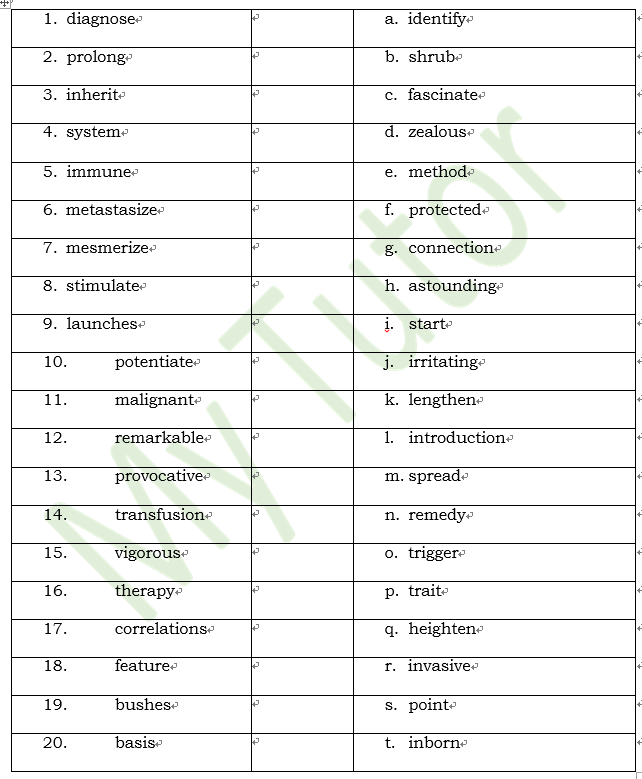
Part 1 (Comprehension Questions):
- What is AI?
- What is Todai Robot Project?
- What are the two different types of exams in the University of Tokyo?
- Can Todai Robot read and understand? Why?
- For the second stage of the exam which is written test, how many words are required to write?
- How does Todai answer a written test?
- Does Todai write a better essay than most of the students who took the exam?
- In the distribution gap that she shows with Todai and half a million students who took the same exam, how much percent does Todai got from the test? Is it capable to pass the exam?
- What is lacking about the AI?
10. In her statement what is the real meaning of knowledge for most of the students?
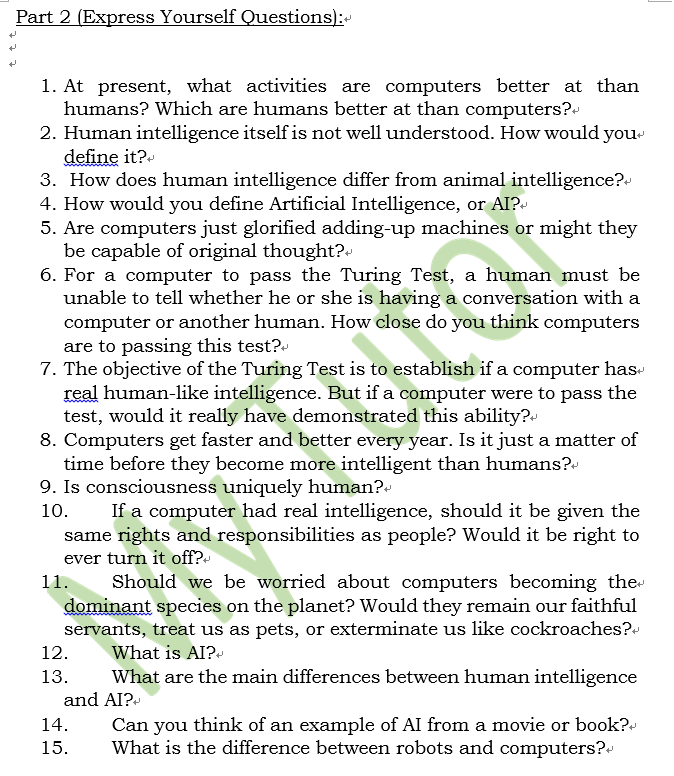
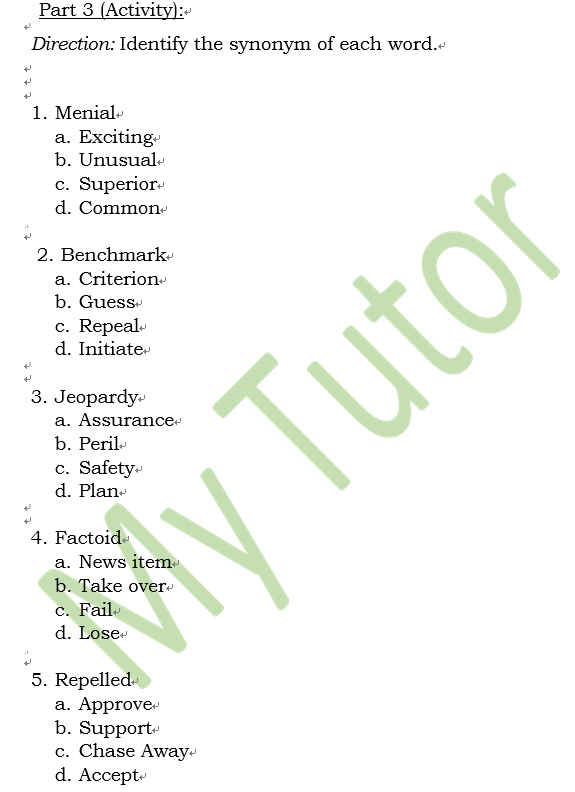
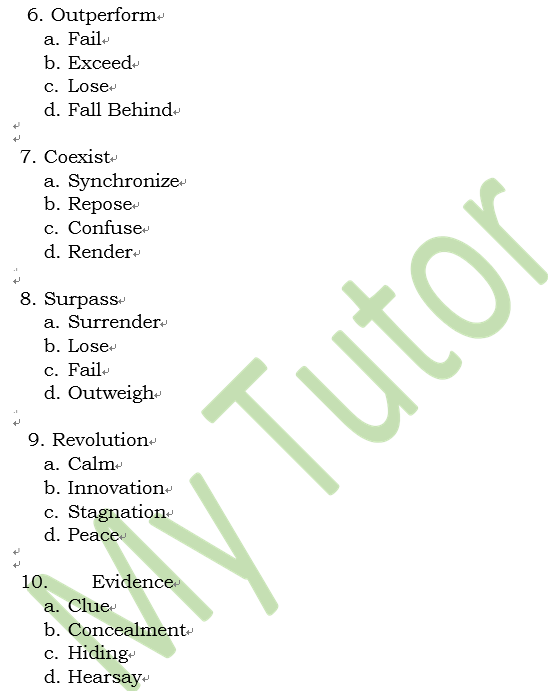
Part 1 (Comprehension Questions):
- Who was the speaker in the speech?
- Horowitz was a cardiologist that specializes what?
3 What was the chimpanzee’s problem and what favor the veterinarian ask to Horowitz?
- Barbara Horowitz is currently working with two companies. What are those companies?
- According to the speech, physicians and veterinarians were essentially taking care of the same disorders in their animal and human patients. Name three disorders that were mentioned in the speech.
- How did Horowitz discuss the exciting connections of diagnoses between cardiologists and veterinarians about fear-induces heart failure?
- How did Horowitz tackle the exciting connections of diagnoses between cardiologists and veterinarians about self-injury?
- How did Horowitz tackle the exciting connections of diagnoses between cardiologists and veterinarians about postpartum depression and postpartum psychosis?
- According to the speech, what do you call a veterinarian who can only care of one species?
10. At Zoobiquity conferences, what can participants learn?
Part 2 (Express Yourself Questions)
- Should animals be kept in a zoo?
- Do you agree that a dog is a man’s best friend? Why?
- Have you ever seen a dog that helps people, such as one to assist a blind person or a policeman?
- Do you think people should buy and wear fur coats?
- Do you think it is acceptable to test cosmetics on animals?
- Do you agree with testing on animals to find new medicines?
- What do you think of hunting? Would you eat an animal that you killed yourself?
- Do you think the most important thing by which psychopaths can be recognized is their attitude toward animals? Explain why.
- Do you think it is a good pattern in general to judge people by their attitude toward animals? Explain why.
10. What do you think about GMO farm animals?
11. Do you think people should be allowed to clone people or organs of people? Why?
12. Do you think that one-day science will find a way to make
people live forever? If so, do you think that that would be a good or a bad thing?
13. What do you think the worst disease to have would be?
14. What do you think about the health care system in your country? How could it be improved?
15. Do you think medicines are tested enough before they are put on the market?
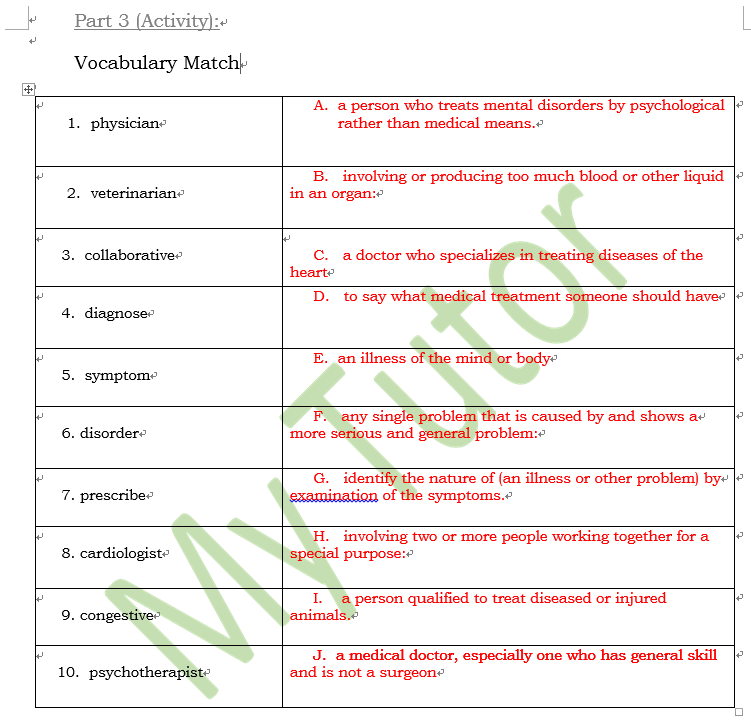

名詞の不規則変化を文の中で正しく使うことでIELTS / TOEFL
スピーキングとライティングの評価を上げることができます。
Most of the nouns are made plural by adding “s” or “es” in the end. Of course, we know that some nouns change their spelling or stay the same regardless of the number. They are called irregular-plural nouns. It is significant to know the rules of converting singular nouns to their plural forms because one reason is that, our English skill is better assessed and determined by other people based on how we talk about different nouns, and how we use them in sentences.
Below are the rules in changing irregular nouns to their plural forms:
以下は代表的な名詞の複数形不規則変化になります。
▮ 「注意すべき集合名詞」
fish やfruitなどそのままの形で「魚全般」「くだもの全般」を表します。
Some nouns never change their spelling and remain the same
when transformed to plural.
Fish-fish Fruit-fruit
例文:I saw a school of fish in the river (川の中に魚の群れが見えた)
例文:Does this tree bear much fruit? (この木には果物がたくさん実りますか)
▮ 「単数形と複数形が同じ」
Deer-deer Sheep-sheep Means-means, Species-species
例文:There are many sheep here.

▮ 「不規則変化」
Nouns that change some of their letters
in their plural form.
Woman-women
Child-children
Tooth -teeth
▮ 複数形になると別の意味を持つ名詞
There are nouns which only have their plural forms.
Most of them come in pairs.
Scissor (切る)-scissors (はさみ)
Force (力) – forces (軍隊)
Arm (腕) ― arms (武器)
Glass(グラス)― – glasses (メガネ)
Force

Forces

Regardless if there is only one piece of scissors,
we still use the plural form.
Example: Can you get the scissors on the table?
SPECIAL CASES: 不規則変化
There are, however, special cases in producing plural nouns:
▮ 外来語の複数形は、英語のルールに従っていないので注意
Examples are Latin and Greek words also have their own plural forms.
(is-es)
-basis to bases
-hypothesis-hypotheses
(a-ae)
Antenna-antennae
Alumna-alumnae
(us-i)
Nucleus -nuclei
Fungus-fungi
Alumnus-alumni
Cactus-cacti
Octopus-octopi
(on-a)
Criterion- criteria
Phenomenon-phenomena
▮ 数字の複数形 語尾に-s を付ける
-We add s to numbers to make them plural.
Example: There are many number 4s in your mobile number.
Please take away the 2s in this contact detail.
I was born in the 1980s.
(Note: To replace 19 in the statement, put apostrophe instead.)
▮ 数字の語尾に-’s を付ける
I was born in the ‘80s.
▮ 語尾に-s または-‘s を付ける
–To make the letters plural, add “s” to the capital ones and ‘s to the small cases.
Example: I got As on my exams.
We have to find the value of x’s in this mathematical problem.
▮ 略語に –s を付ける
-Simply add “s” for abbreviations.
Example: Can I have your IDs?
I have to go to the store to buy some CDs.
Note: There are many different rules to form the plural forms of nouns. However, there are some words now that have been accepted by experts of the language, and it sometimes vary to different places where English is used. Examples are octopuses, cactuses, and etc.

What are infinitives? 不定詞とは
to不定詞を使うと、1つの文と同じ内容を、もっと短く言い表すことができます。
言い換えれば、to 不定詞は「これから先のこと」について述べた文を
「圧縮」したものと言えます。
to 不定詞を正しく使うことで、IELTS,TOEFLなどのスピーキングや
ライティング試験では高評価を得ることができますのでしっかりと学習してください。
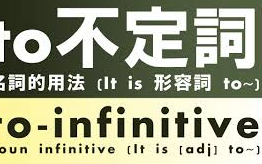
▮ to + 動詞の原形
to 不定詞の主な用法として文の中で名詞の働きをします (名詞的用法)
Example: to +eat = to eat
To eat is what I really need right now after that long travel.
In this example, you can say that the phrase: to eat, does not function as
a verb but as a noun. In addition, it is the main subject of the sentence
talking about what the speaker really needs right now. And that is, to eat.
<To eat は動詞としてではなく、名詞の働きをして文の主語になっています。>
「名詞的用法」の他にも「形容詞的用法」、「副詞的用法」もあります。
例:I have a lot of homework to do. 「形容詞的用法」
:She is working hard to buy a car. 「副詞的用法」
▮ to を使いわない「原形不定詞 bare infinitive」
知覚動詞 + O + 動詞の原形
Another thing that confuses us to determine infinitives from verbs
is when we use infinitives without “to”, making it appear similarly to
an action word but with another purpose. We call these “bare infinitives.
” Bare or zero infinitives are special kinds of infinitives without
the use of “to.” Most of these are preceded by special verbs
(verbs of senses) such as hear, see, feel, smell, and taste.
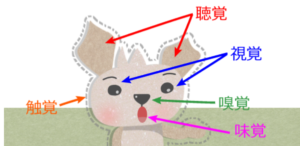
hear, see, feel,のような知覚を表す動詞は、目的語の後に動詞の原形を置いて
「Oが〜するのを見る/聞く/感じる」という意味を表すことでできます。
The pattern is: special verb + direct object + bare infinitive
この形を取る動詞は知覚動詞と呼ばれ、
<知覚動詞 + O + 動詞の原形>という形で使われます。
Example:
I hear the birds chirp. (hear+ the birds + chirp) I can hear the birds chirp.
(鳥の泣き声が聞こえる)
Instead of saying I can hear the birds (to chirp),
we take out the word “to” and retain the main verb.
Another example: I hate to see my boyfriend smoke.
私はボーイフレンドがタバコを吸うところを見るのが嫌だ
Note that with bare infinitives, we can never use the s-form of the verb
even when pertaining to a singular object.
▮ When to use Gerunds and Infinitives? 動名詞と不定詞使い分け

Though we already learned the functions of both, we have to keep in mind
that there are some standards or rules set to determine
whether to use gerunds or infinitives.
動名詞 ➡ 習慣的行為、や一般論
We use gerunds if the actions are completed and fixed or when it refers to an activity.
Example: I like reading a lot. 私は多読が好きだ
不定詞 ➡ これから先のこと、可能性のあること
We use infinitives if the actions are not yet started (future), unreal, and abstract.
Example: I like to bake a cake on your birthday.
▮ 目的語が動名詞と不定詞で意味が異なる他動詞
forget / remember/regret /try / stop
Keep in mind as well that choosing between gerunds and infinitives can change
the meaning of the entire sentence.
「remember 」
Example: I remembered to bring my coat.
= I remembered that I had brought my coat.
コートを忘れずに持って行ったことを覚えている
I remembered bringing my coat.
= I brought my coat and I remembered it
コートを持参したことを思い出しました
「regret 」
Example: I regret rejecting your offer.
あなたの申し出を断ったことを公開しています。
I regret to say that we must reject your offer.
残念ながら、あなたの申し出をお断りしなければなりません。
Therefore, it is important that we know their functions and differences
although they both act nouns in sentences.








